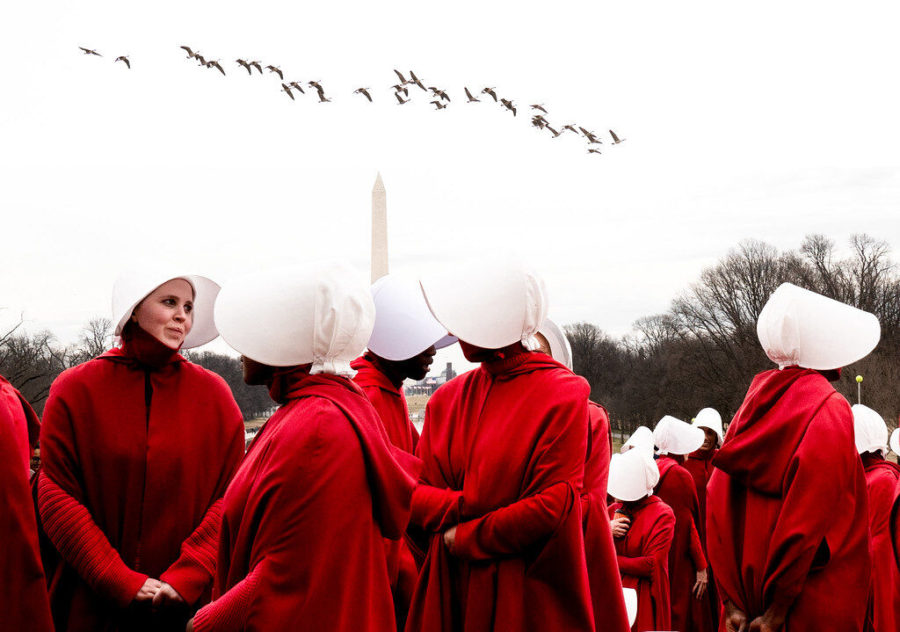Hamel: Blessed be the fruit
May 13, 2021
“Blessed be the fruit.”
“May the Lord open.”
“Under His eye.”
These phrases are what we call “adjacency pairs.” They are tidbits of conversation that follow well-established patterns. They are the equivalent to “good morning” from one person to another.
I’ve been watching “The Handmaid’s Tale” (which I will be abbreviating as THT moving forward). I read all 131 riveting pages in about 30 hours, and by riveting, I mean stunning. It’s crafty and one of the best pieces of literature I have ever had the privilege to read and analyze. In this column, I will be discussing the television show on Hulu.
Most of you have probably read my biography at the bottom of my columns. Half of my life is STEM, the other half liberal arts. If I wasn’t going into a STEM field, I would get my doctoral degree in rhetoric and composition. I would want to study my life away analyzing pieces of literature in their social and historical contexts at a university.
People often ask me what it’s worth, learning something that’s not in STEM. It’s a question that even I have been struggling to answer for years, but I believe I’ve always known the answer. The liberal arts teach you about humanity, its complexity and why it’s beautiful. I don’t only want to learn about the logistics of how the world works. I want to learn about how we as humans have been influenced, how we influence each other and how we have represented these motions within the works we create. It’s beautiful.
I think about this answer when I watch THT. The story is short but the experiences are long, much like the lives of the handmaids. They are reduced to one thing and one thing only: their unique biological function of fertility.
In the mid- and late-1800s to mid-1900s, the role of women was referenced as the “women’s sphere.” Kitchen, cooking, laundry, children. Wait, laundry and cooking are reserved to “Martha’s.” Black women. In the series, it’s specifically stated as “domestic feminism.”
We love traditions, don’t we? Tradition can change, but its roots never do. THT is a complex hybrid of “Animal Farm” and “1984,” with social and historical contexts mirroring the 1940s Nazi Germany (with a splash of climate change).
Big Brother is watching. Books are burned. Gay people are hung. It’s all about survival. Ditch the zombie apocalypse — the failure of reproduction will surface dystopia. The handmaids are a breeding stock. If you’re fertile, you’re an expensive cow but treated as if you’re on the slaughter block. This position is reserved for middle- and lower-class women. Those of higher class maintained status and safety. It’s a sick game of Monopoly.
Returning to the adjacency pairs at the beginning of the column: they’re a motif, but also a whip. One whip for fear. Another for order. One last whip for humanity. The humanity at risk.
Humans are unique mammals. They are the only animals that have complex thoughts and emotions and decision-making capabilities. Those in charge of this dystopian attempt to reprogram humanity to return populations to a logistic curve.
Have you ever thought about humanity becoming extinct, like so many other species? A species can’t live forever. They either evolve or die off. Have you also ever thought about humans trying to play God? Maybe we can’t live forever.
While the handmaids are treated as a breeding stock, their strength is as strong as the silicone-fluoride bond (the strongest single bond between atoms known in chemistry). You speak as you are spoken to but want to scream. You wear a mask, but you cry on sight. Your only physical interaction is once a month, but consent isn’t anyone’s concern.
The worst (or best) part of it all is that I can see this specific dystopia becoming a reality, like a lot of other readers and viewers. We watch out of intrigue and, probably, fear of a future that might be real.







